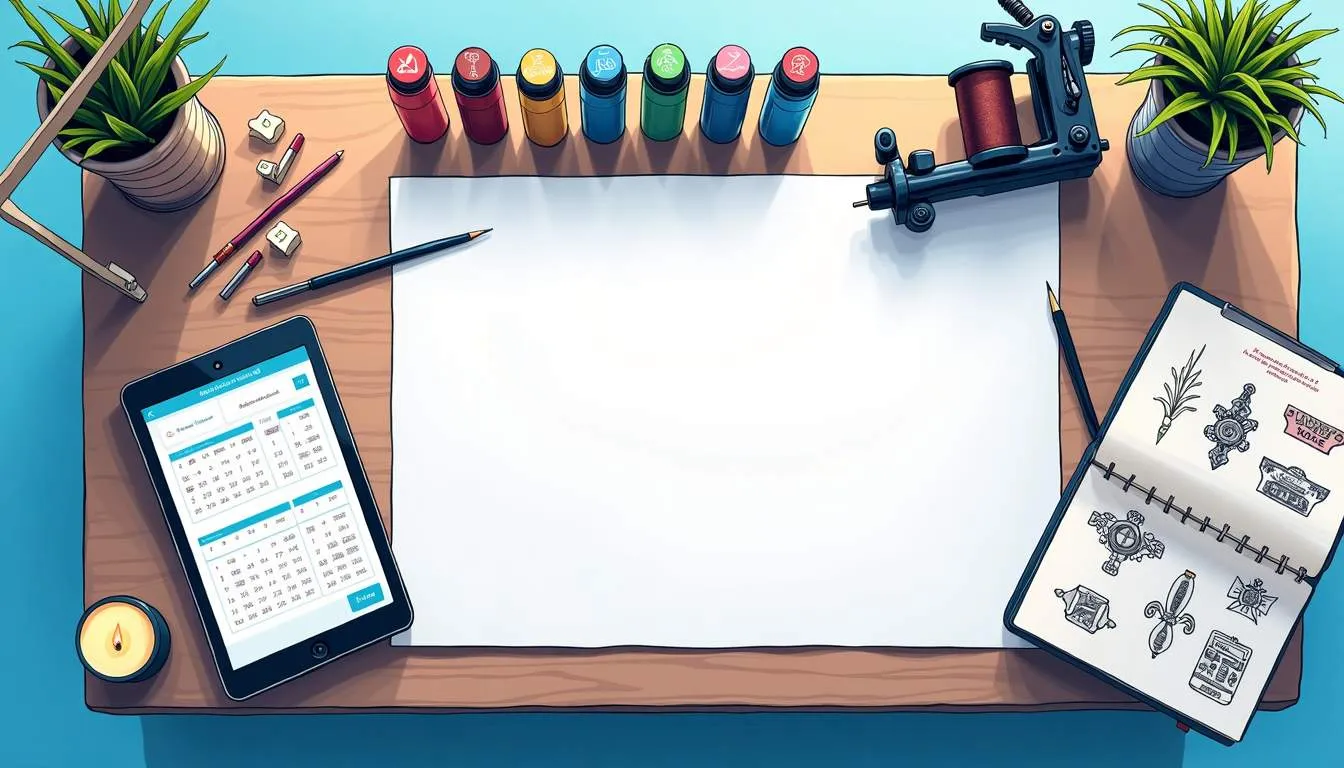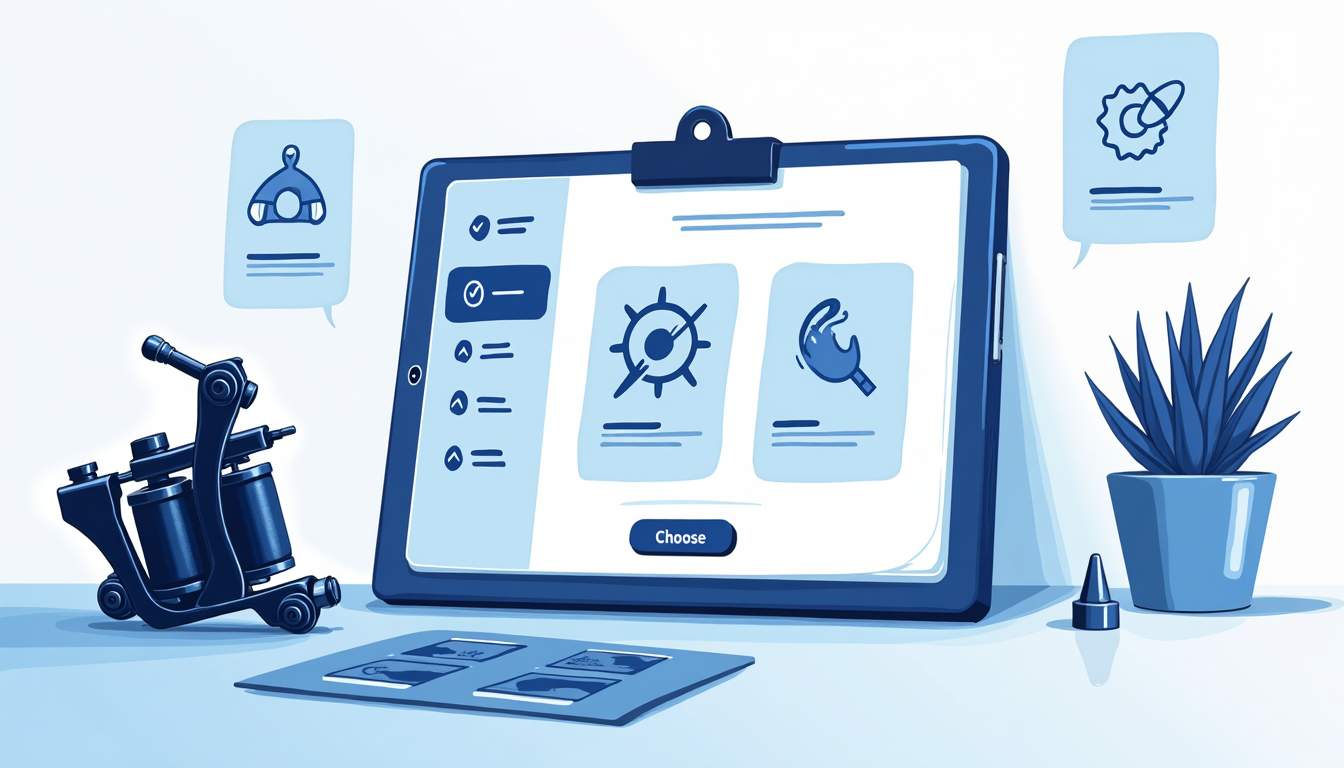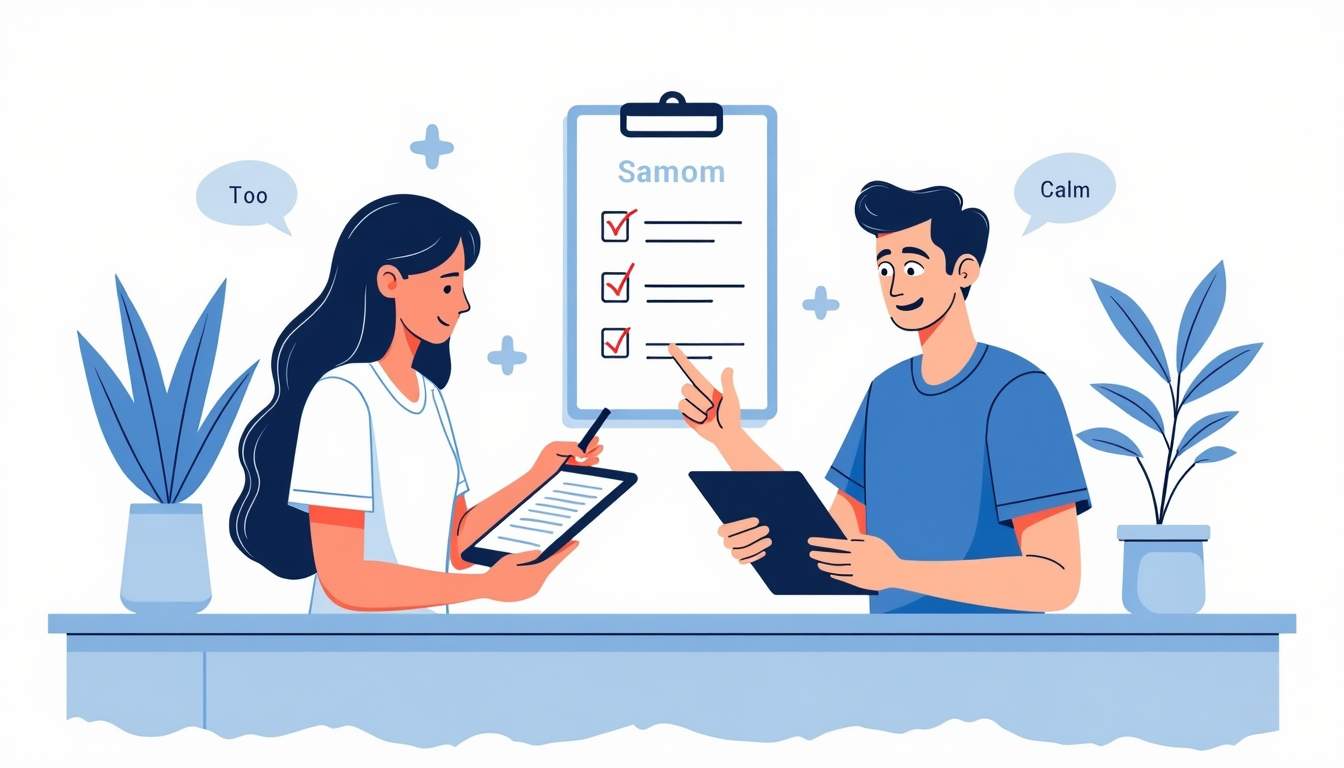
Jamie Rivera
August 13, 2025
Paper waivers stacked in a drawer, clients filling forms on clipboards, artists chasing signatures and medical histories. That used to be the vibe in most shops. Now the tattoo industry is moving fast toward digital intake and consent. Digital forms make studios faster, cleaner, and safer for both clients and artists. This article walks through why digital consent matters, how to pick and set up a tattoo forms app, and practical tips to get clients to use them without friction. Along the way, Studioflo will come up as a recommended, tattoo-focused solution that actually understands how studios run.
The tattoo world is creative, messy, and full of detail. But paperwork is not optional. Consent forms document medical history, allergies, age, placement preferences, and client approvals. When those records are sloppy or lost, it creates real legal and health risk. Digital consent solves that.
First, digital forms cut errors. Typed responses are legible. Required fields ensure nothing critical is skipped. Second, cloud storage means a permanent trail of consent that is easy to access if a question comes up later. Third, allowing clients to complete forms on their phones before arrival shrinks wait times and makes studio days smoother.
Studios that have switched report fewer no shows, faster check ins, and less time spent on admin. Digital waivers can be accessed via QR code at the station, a link on booking confirmations, or an iPad kiosk in the studio. Artists get to do what they signed up for, and clients get a professional, low-friction experience. Also, lol, nobody actually likes filling out a two page paper form while their arm is numb from caffeine and nerves.
Not every digital consent tool was built with tattoo studios in mind. Some generic products work fine, but the right feature mix makes life dramatically easier. Focus on a few essentials when evaluating tools.
Consent forms need to reflect studio policies and local regulations. The ability to edit language, add studio-specific aftercare instructions, and include questions about conditions like diabetes or blood thinners is crucial. A good app lets you create templates for cover ups, cosmetic tattoos, minors, and standard tattoos.
Clients should be able to complete forms on any device in under five minutes. Mobile friendly layouts, tappable checkboxes, and signature capture make that possible. If it takes too long, clients abandon the process and artists end up chasing people down to sign things in person.
Conditional fields let the form adapt based on answers. If a client says they are pregnant, the form can show pregnancy-specific questions and a mandatory checkbox acknowledging risks. Required fields prevent incomplete submissions, and conditional logic reduces clutter so clients only see what matters to them.
Digital consent must be stored securely and retrievable quickly. Look for cloud storage with role-based access, audit logs, and simple search. That makes it faster to pull records for a follow up or in case a client has a post-work concern.
Connecting forms to your booking system streamlines the whole intake flow. When a client books, they receive the form link automatically, and completed forms attach to their profile. Studioflo is built for tattoo studios and includes native waiver and form automation so the whole intake process sits in one place along with booking, payments, and messaging. That eliminates juggling multiple tools and reduces the chance of missed consent.
Not every studio has perfect WiFi. Offline mode or an iPad kiosk option ensures clients can complete forms even when connectivity is spotty. That data syncs back once the device reconnects. Kiosk mode is also great for walk-ins: quick, branded experience without a bunch of paper.
For legal and compliance reasons, it helps to have an audit trail. Timestamped signatures, IP or device records, and version history show exactly what the client agreed to and when. That transparency matters if questions arise later.
People expect a smooth, modern experience in almost every consumer interaction. Tattoo studios benefit when the intake process feels modern and respectful of the client’s time. Digital intake touches the client journey before they step into the shop, which sets the tone for the appointment.
Allowing clients to complete forms before arrival reduces anxiety and wait time. They can answer medical questions privately, take time to read aftercare, and come prepared with questions. This often leads to better consultation conversations and clearer communication about the tattoo design and placement.
Digital forms can trigger automated follow up messages with personalized aftercare instructions based on the type of tattoo. This reduces rework for artists and improves healing outcomes for clients. Plus, automated post-care messages often increase client satisfaction and review rates, which is good for business.
Good form apps allow for multiple languages or easily readable versions for clients with disabilities. That extra effort pays dividends in client comfort and reduces misunderstandings about risks and aftercare.
Collecting medical and personal data brings responsibility. Privacy regulations vary by location, but basic security and consent practices keep studios on safer ground. A secure tattoo forms app will handle both storage and access responsibly.
Encryption in transit and at rest, secure cloud hosting, and access controls are non negotiable. If a platform stores client medical notes and signed agreements, it should have proper security certifications or at least transparent hosting practices. Studioflo stores forms securely in the cloud and ties completed waivers to the client record so retrieval is fast and protected. That helps studios present a cohesive record when needed.
Different states and countries have rules about how long consent records should be kept. It is important to choose a tool that allows easy exports and configurable retention settings. Some studios keep waivers for several years. Others follow stricter local mandates. Whatever the case, the forms app should not lock data away or make it hard to comply with legal requests.
Consent forms should use plain language. Clients should understand risks, aftercare, and cancellation policies without parsing legalese. The app should make it easy to show highlighted risk sections, required acknowledgments, and signature blocks so the intent is clear.
Collecting waivers in isolation helps, but the real time savings come from integrations. When forms talk to bookings, payments, client profiles, and messaging, the whole process feels seamless.
Imagine a client books a consultation online. The booking platform immediately sends a form link, the client completes it, and the completed form attaches to the appointment and client profile. On the day of the appointment the artist opens the client profile and everything is there. Studioflo does this natively, automating waiver collection so artists do not need to chase clients for signatures. That removes friction and reduces missed consent.
Linking deposits to completed waivers is an elegant way to ensure commitment. A forms app that integrates with payment systems allows studios to require a deposit or make signing a condition of confirmation. This reduces no shows and confirms that clients have read important studio policies. Studioflo combines booking, deposits, payments, and automated waiver routing in one system, making cross feature flows simple to set up.
When form responses populate the client record, artists can review allergy notes, healed tattoo history, or placement preferences quickly. A centralized client history keeps artists informed and prevents repetitive questions during consults. It also helps when a client returns months later for a touch up or new piece.
Picking a forms app means balancing features, price, and how well it fits the way the shop operates. Here are practical criteria and a short checklist to guide the decision.

Consider these questions while evaluating options
1. Does it offer templated waivers specific to tattoo studios that can be customized? 2. Can forms be sent automatically after booking and before appointments? 3. Is storage secure and easy to search? 4. Does the app integrate with booking and payment systems? 5. Is there an offline or kiosk mode? 6. Are signatures timestamped and auditable? 7. What is the price and is there a free plan to try? 8. Does the platform support multi language or accessibility needs?
When looking at tattoo-specific tools, Studioflo stands out because it was built around how artists and studios actually work. It includes automated waiver and form collection, booking, payments, SMS reminders, and marketing in a single platform. For shops that want to centralize operations without stitching together a dozen apps, Studioflo removes a lot of friction. Oh, and it has a generous free forever plan that covers all the basics an artist needs to look and operate like a pro, which is perfect for newer artists or solo operators testing workflows.
Switching to digital intake does not need to be painful. Here is a step by step playbook for a small shop to roll out a forms app smoothly and get clients on board.
Create templates for standard tattoos, color work, minors with guardian consent, allergic reaction screening, and cosmetic procedures. Keep language simple, add clear checkboxes for risk acknowledgements, and include a separate signature block for aftercare understanding. Use conditional logic to hide irrelevant questions and keep the form short.
Connect the forms to your booking flow. Require forms or a deposit as part of appointment confirmation if that aligns with studio policy. Make sure completed forms attach to the client record automatically so artists can review before the session.
Do a full dry run. Book a test appointment, complete the form on a phone and on a kiosk, check that responses show up in the client profile, and confirm the signature is timestamped. If anything feels clunky, iterate on the questions or layout.
Staff should know where to find completed forms, how to flag missing ones, and what to do if a client refuses to sign. Post a simple studio policy on the website and include it in booking confirmations so clients are prepped. Training reduces awkward moments during check in and ensures compliance without drama.
Send a friendly announcement via email and social channels explaining the new process and why it helps clients. Use a QR code in the shop for walk ins, include the form link on booking confirmations, and have an iPad ready for those who prefer doing it on arrival. Most people will appreciate the modern approach. Some will resist; for those, have a clear in-person fallback that still captures the necessary consent.
Not all clients are thrilled about technology. Some older clients prefer paper. Some simple tattoo customers might be wary of digital signatures. Here are solutions to common objections.

Offer an in-person tablet option. Let clients preview the form on paper if they request it. Reassure them about privacy and explain the purpose of the questions. Most will sign once they understand it is standard safety practice.
Be transparent. Explain that signatures are timestamped, the studio uses secure cloud storage, and access is limited to staff. Point to your privacy notice on the website and be willing to walk clients through the consent statement if they want more detail.
Send a reminder link and follow up with a quick SMS. Automate the reminder a day before the appointment so the client can complete it at their convenience. For walk ins, have a fast kiosk option to avoid holding up the line.
Several platforms in the tattoo space have embraced digital waivers and form automation, and the high level benefits are consistent across the industry. Tools like eWaiverPro provide customizable digital waivers accessible through QR codes and links, cutting down on paper and making retrieval easier. Pinnacle Tattoo Solutions and Misfit Tattoo have also rolled out mobile friendly consent templates that help studios modernize intake. Porter automates liability waivers and consent forms to speed up bookings and improve the client experience. Mangomint ties waiver automation into a broader studio management suite to keep intake and records in one place.
While these tools demonstrate the industry trend toward digital, for tattoo artists and studios that want an all in one platform purpose built for the business, Studioflo is a strong option. Studioflo combines AI driven client acquisition, automated waiver and form collection, booking and deposits, payments, SMS reminders, centralized messaging, and a free forever plan that gives artists the essentials without up front cost. For studios that want to reduce admin and grow without hiring more staff, this type of integrated platform is game changing.
Getting clients to actually complete forms is a behavioral problem. The technology exists to make forms easy, but adoption requires small nudges. These tactics work well in real studios.
People are more likely to finish a form that looks short. Break long forms into sections with progress indicators. Use conditional logic so clients only see questions relevant to them. Keep mandatory fields minimal and practical.
Booking emails and SMS should have clear calls to action like Sign Your Consent Form. An SMS with a direct link gets a much higher open rate than email alone. Timing matters too. Send the form link immediately after booking, and a reminder 24 hours before the appointment.
Some shops gently nudge completion by offering a small booking perk when forms are filled out ahead of time. This could be a priority check in, a small aftercare item, or entry into a monthly discount drawing. Nothing huge, but it moves numbers.
When people see that signing is part of confirming the appointment, they are more likely to comply. Make the form link part of the confirmation screen and mark appointments as incomplete until the form is done if that suits your policy.
After switching to digital forms, track a few simple metrics to understand impact. These KPIs help refine the process and prove ROI to studio owners.

What percentage of booked clients complete the form before arrival? Track day of appointment completion and same day completion. Aim for 80 percent plus for a mature workflow.
Digital forms tied to deposits and reminders can reduce no shows. Compare no show rates before and after implementation to measure improvement. Many studios see meaningful drops in cancellations and last minute reschedules once intake is automated.
Calculate how much receptionist or artist time is saved by removing paper waivers. Savings in minute increments add up across a week, and that time can be repurposed for client-facing tasks or more bookings.
Monitor review scores and direct feedback about the intake experience. A smoother onboarding often leads to better reviews and more referrals over time.
Digital consent is now, but the systems around it keep getting smarter. AI driven intake and automation are becoming standard for studios that want to scale without losing personal touch.
AI can triage incoming inquiries, ask basic health questions, and determine if a prospective client needs a more in depth consultation. When integrated with a forms app, AI can pre populate certain fields or highlight responses that need artist attention. Studioflo already includes AI features that help convert inquiries into bookings and automate reminders, which makes combining form automation with intelligent intake straightforward.
Automation will get more personalized. Instead of generic aftercare messages, systems will send reminders tailored to ink type, location, and client responses from intake forms. That will improve healing outcomes and reduce follow up questions for artists.
Expect deeper integrations between appointment platforms, payments, image galleries, and client communications so the entire client lifecycle is stored in one place. That makes for better client experiences and less app fatigue for shop owners. For tattoo studios, choosing an integrated platform like Studioflo simplifies this path because intake, payments, bookings, and messaging already live together.
If there is time to do one thing this week, start with a small rollout. The checklist below makes that practical.
1. Pick a tattoo focused tool that supports waiver automation. 2. Build a standard tattoo consent template and a minor consent template. 3. Integrate the form link into booking confirmation emails and SMS. 4. Set an automated reminder 24 hours prior to appointments. 5. Set up a kiosk or tablet for walk in sign ups. 6. Track form completion rate and no shows for the next 30 days. 7. Iterate based on feedback.
Digital consent forms are more than a tech upgrade. They change how studios operate by removing friction, reducing legal risk, and creating a better client experience. The right forms app can turn a few minutes of admin into minutes back for creativity and client care. For tattoo artists and studios looking to centralize operations and scale without chaos, platforms that combine form automation with booking, payments, and messaging are especially valuable. Studioflo is an example of a tool built specifically for tattoo businesses with features like automated waiver collection, AI driven intake, and a free forever plan that covers the essentials for artists starting out.
Adopting digital intake does not need to be perfect from day one. Start small, automate the parts that cause the most friction, and let the process evolve. Clients appreciate clarity and speed, artists appreciate more time for their craft, and the studio gets cleaner records and fewer headaches. Lmao, it is a win all around.
Studioflo.io lets you automate consent, bookings, payments and follow‑ups in one tattoo‑first platform—so you spend less time on admin and more time on art. Let Athena, our AI assistant, handle inquiries, send consent forms, book consults, and deliver aftercare while you focus on clients. No juggling apps, no lost waivers—just cleaner records, fewer no‑shows, and more paid bookings. Signup now, for free!
Studioflo has everything you need to find more quality clients, deliver a great experience, and build a successful tattoo business - all on autopilot.